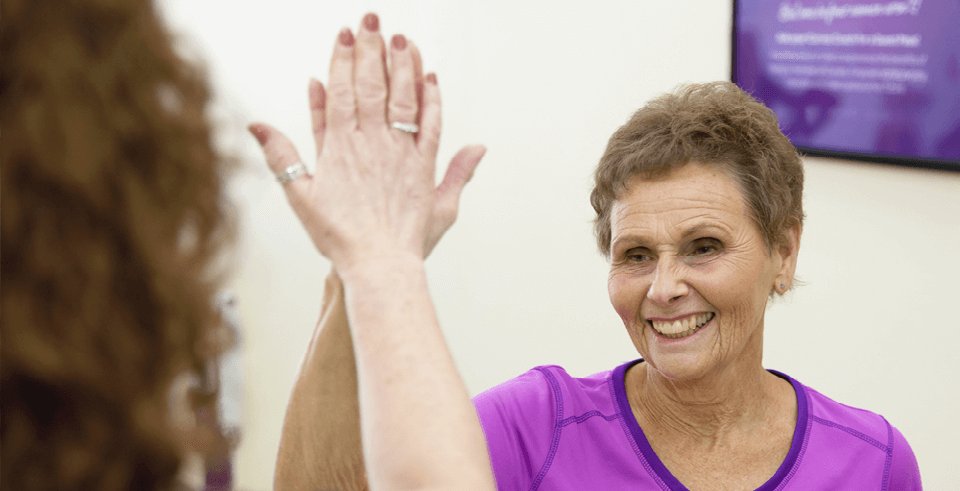The Key to Exercise Success is Mind Over Matter
If you exercise, you know not every workout is your best. Sometimes it feels more difficult, and you may be tempted to quit. The same thing can happen with weight loss motivation when you hit a plateau. This demotivation can be fleeting, taking you away from your workout plan for a day or two. Or, it can drag out and make you totally lose sight of your fitness relationship goals.
A new study puts some merit to the power of mindset when it comes to your exercise routine. According to the research published in Health Psychology, the attitude you take toward your workout plan can affect your health and wellbeing. Scientists1 looked at more than 60,000 adults over 16 years. They examined their levels of physical activity, as well as their thoughts about their health. They found that kind, supportive thoughts were just as important as the actual exercise itself. The participants who compared their progress at the gym to those around them started to think of themselves as less healthy than the exercisers who did more. (Think comments like, “she’s in much better shape than I am,” “she looks so much better in those leggings than I ever would,” or “she could do a lot more pushups than I can.”) Positive thinkers are more likely to live longer, healthier lives, even when their exercise levels are the same as their counterparts.
The moral of the story: negative self-talk can subtract from the benefits of exercise. To harness all the positive that goes along with a regular full body workout—and to keep your own mindset upbeat—here are some health tips:
Talk to yourself nicely
As the Health Psychology study showed, negative self-talk is counterproductive when it comes to a exercise routine. On the flip side, positivity can give your full body workout a healthy boost. Telling yourself “you can do it!” is much more powerful than you might think. When you say positive things to yourself as you go through a tough workout, it can make the difference between your best workout and quitting early. Say, “I’m so lucky my body is strong enough to do this,” or, “I feel fantastic.” Whatever it takes to get you to push a little harder.2
Celebrate small goals
Chances are, when you started your workout plan, there were certain fitness goals you set out to achieve. Of course, no one achieves all their goals in the first few months of an exercise routine; but celebrating little milestones along the way can be huge when it comes to weight loss motivation. In one study published in the Journal of Applied Behavioral Analysis, researchers looked at the effect of goal setting on college-level rugby players. They found that players who set specific goals showed enhancements in the specific areas they set out to improve.3
Be thankful
Sometimes just reminding yourself of all the things you have to be grateful for—a strong body that can do a tough full body workout and the will to engage in exercise and a healthy eating plan, for example—is enough to boost your body and mind. In a study published in the Journal of Personality and Social Psychology, researchers asked study participants to write down a few sentences a week. The first group wrote about things they were thankful for, and the second group wrote about things that annoyed them. At the end of 10 weeks, the group that wrote about things they were thankful for were happier and felt better about their lives. And as a bonus, they exercised more and went to the doctor less than the group that focused on the negative.4
Use self-motivation to push yourself
By telling yourself you are worth it, you can do it, or other positive sentiments, you will subconsciously push yourself as you go through the Curves Circuit. And research shows, pushing yourself is the best way to get results, both in terms of your performance during your workouts and your weight loss once you walk out of the gym. A study done at the Scripps Research Institute and published in EuroMediterranean Biomedical Journal found that pushing yourself during short bouts of intensive exercise (like the Curves workout plan) changes the body and muscles in ways milder exercise does not. This positive feedback cycle will help you reap the physical and mental health benefits of exercise and perform your full body workout to your highest potential.5
Use positive self-talk as weight loss motivation
Research shows that gratitude and optimism can help with weight loss encouragement. When we’re thankful, we tend to be more positive and happier overall. This makes us more likely to want to lose weight in the first place and more likely to succeed with a weight loss and workout plan. According to results of a Swedish study published in Eating and Weight Disorders, participants in a cognitive therapy treatment program, which encourages positive responses, lost more weight than those who were not in therapy. They were more likely to keep the weight off, too.6
Surround yourself with people who provide weight loss encouragement
To stay upbeat as you go for your weight loss and fitness relationship goals, spend time with people who make you a better, happier person. You will find lots of support from the ladies you meet at Curves women only gym. Women who are in the same boat as you–who enjoy the Curves circuit and want to embrace a healthier lifestyle overall–will make you feel like you have what it takes to overcome obstacles and reach your goals.
To find out more about how you can informed lifestyle and health choices, visit our blog under the ‘Live’ category! You can also learn more about how the Curves Circuit can benefit your lifestyle here.
1 American Psychological Association
2 American Diabetes Association
3 Journal of Applied Behavior Analysis
4 Journal of Personality and Social Psychology
6 Brookhaven Hospital https://brookhavenhospital.com/want-to-lose-weight-try-thinking-like-a-thin-person/








